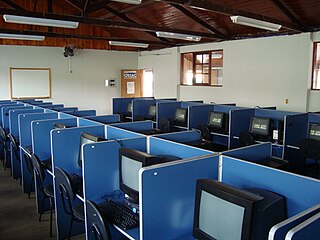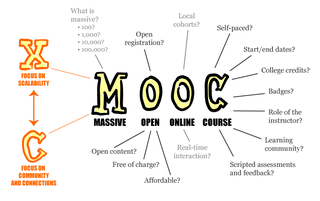Related Research Articles
Distance education, also known as distance learning, is the education of students who may not always be physically present at school, or where the learner and the teacher are separated in both time and distance. Traditionally, this usually involved correspondence courses wherein the student corresponded with the school via mail. Distance education is a technology-mediated modality and has evolved with the evolution of technologies such as video conferencing, TV, and the Internet. Today, it usually involves online education through an online school. A distance learning program can either be completely a remote learning, or a combination of both online learning and traditional in-person classroom instruction. Other modalities include distance learning with complementary virtual environment or teaching in virtual environment (e-learning).
Blended learning or hybrid learning, also known as technology-mediated instruction, web-enhanced instruction, or mixed-mode instruction, is an approach to education that combines online educational materials and opportunities for interaction online with physical place-based classroom methods.

Asynchronous learning is a general term used to describe forms of education, instruction, and learning that do not occur in the same place or at the same time. It uses resources that facilitate information sharing outside the constraints of time and place among a network of people. In many instances, well-constructed asynchronous learning is based on constructivist theory, a student-centered approach that emphasizes the importance of peer-to-peer interactions. This approach combines self-study with asynchronous interactions to promote learning, and it can be used to facilitate learning in traditional on-campus education, distance education, and continuing education. This combined network of learners and the electronic network in which they communicate are referred to as an asynchronous learning network.
A learning management system (LMS) or virtual learning environment (VLE) is a software application for the administration, documentation, tracking, reporting, automation, and delivery of educational courses, training programs, materials or learning and development programs. The learning management system concept emerged directly from e-Learning. Learning management systems make up the largest segment of the learning system market. The first introduction of the LMS was in the late 1990s. LMSs have been adopted by almost all higher education institutions in the English-speaking world. Learning management systems have faced a massive growth in usage due to the emphasis on remote learning during the COVID-19 pandemic.

Turnitin is an Internet-based similarity detection service run by the American company Turnitin, LLC, a subsidiary of Advance Publications.
Educational technology is the combined use of computer hardware, software, and educational theory and practice to facilitate learning. When referred to with its abbreviation, "EdTech", it often refers to the industry of companies that create educational technology. In EdTech Inc.: Selling, Automating and Globalizing Higher Education in the Digital Age, Tanner Mirrlees and Shahid Alvi (2019) argue "EdTech is no exception to industry ownership and market rules" and "define the EdTech industries as all the privately owned companies currently involved in the financing, production and distribution of commercial hardware, software, cultural goods, services and platforms for the educational market with the goal of turning a profit. Many of these companies are US-based and rapidly expanding into educational markets across North America, and increasingly growing all over the world."
A virtual campus or e campus, refers to the online offerings of a college or university where college work is completed either partially or wholly online, often with the assistance of the teacher, professor, or teaching assistant. Many colleges and universities now offer such courses either partially or wholly online. There are an estimated 4,500 such institutions with total enrollments approaching perhaps 2 million.
A virtual university provides higher education programs through electronic media, typically the Internet. Some are bricks-and-mortar institutions that provide online learning as part of their extended university courses while others solely offer online courses. They are regarded as a form of distance education. The goal of virtual universities is to provide access to the part of the population who would not be able to attend a physical campus, for reasons such as distance—in which students live too far from a physical campus to attend regular classes; and the need for flexibility—some students need the flexibility to study at home whenever it is convenient for them to do so.
In higher education, a course is a unit of teaching that typically lasts one academic term, is led by one or more instructors, and has a fixed roster of students. A course usually covers an individual subject. Courses generally have a fixed program of sessions every week during the term, called lessons or classes. Students may receive a grade and academic credit after completion of the course. Courses can either be compulsory material or "elective". An elective is usually not a required course, but there are a certain number of non-specific electives that are required for certain majors. The entire collection of courses required to complete an academic degree is called a program of studies.

Western Governors University (WGU) is a private online university based in Millcreek, Utah, United States. The university uses an online competency-based learning model, providing advanced education for working professionals. Degrees awarded by WGU are accredited by the Northwest Commission on Colleges and Universities (NWCCU). The university was founded by 19 U.S. governors in 1997, after the idea was formulated at a 1995 meeting of the Western Governors Association to expand education offerings to the internet.

Nazarene Bible College (NBC) is a private Nazarene Bible college in Colorado Springs, Colorado, United States. It was founded in 1964, chartered in 1967, and approved by the Colorado Department of Education to grant degrees in 1970. NBC has a 7:1 student-to-faculty ratio.
The Association for Biblical Higher Education (ABHE), formerly The Accrediting Association of Bible Colleges (AABC) is an evangelical Christian organization of bible colleges in the United States, Canada and Puerto Rico. It is a member of the International Council for Evangelical Theological Education. The ABHE is interdenominational but requires annual affirmation of a common statement of beliefs. It is headquartered in Orlando, Florida.
CU Online represents the University of Colorado’s fully-online bachelor’s, master’s, doctorate, and certificate programs. Originally launched by the University of Colorado Denver in 1996, it is one of the first fully-accredited online higher education platforms. Today, CU Online offers degree programs from all four University of Colorado campuses – CU Boulder, UCCS, CU Denver, and CU Anschutz Medical Campus.
In the history of virtual learning environments, the 1990s was a time of growth, primarily due to the advent of the affordable computer and of the Internet.
Online tutoring is the process of tutoring in an online, virtual, or networked, environment, in which teachers and learners participate from separate physical locations. Aside from space, participants can also be separated by time.

A massive open online course or an open online course is an online course aimed at unlimited participation and open access via the Web. In addition to traditional course materials, such as filmed lectures, readings, and problem sets, many MOOCs provide interactive courses with user forums or social media discussions to support community interactions among students, professors, and teaching assistants (TAs), as well as immediate feedback to quick quizzes and assignments. MOOCs are a widely researched development in distance education, first introduced in 2008, that emerged as a popular mode of learning in 2012, a year called the "Year of the MOOC".

A flipped classroom is an instructional strategy and a type of blended learning. It aims to increase student engagement and learning by having pupils complete readings at home, and work on live problem-solving during class time. This pedagogical style moves activities, including those that may have traditionally been considered homework, into the classroom. With a flipped classroom, students watch online lectures, collaborate in online discussions, or carry out research at home, while actively engaging concepts in the classroom with a mentor's guidance.
A Small Private Online Course (SPOC) refers to a version of a MOOC used locally with on-campus students. University of California Berkeley Professor Armando Fox coined the word in 2013 to refer to a localized instance of a MOOC course that was in use in a business-to-business context. In this regard SPOCs are focused on certain groups of students, which are qualified to take the course and ready to interact with others throughout the learning process. Even though most institutions do not yet award formal recognition of SPOCs, Robert Lue, who runs HarvardX, the university’s digital arm, says that it is becoming more likely that prestigious universities begin to create SPOCs for course-credits.

FlightPath is an open-source, web-based enterprise software application for academic support, academic advising, and degree audit for institutions of higher education. Originally created at a large public university in Louisiana, The University of Louisiana at Monroe, the software package was released as open-source software on March 13, 2013.

Online learning involves courses offered by primary institutions that are 100% virtual. Online learning, or virtual classes offered over the internet, is contrasted with traditional courses taken in a brick-and-mortar school building. It is a development in distance education that expanded in the 1990s with the spread of the commercial Internet and the World Wide Web. The learner experience is typically asynchronous but may also incorporate synchronous elements. The vast majority of institutions utilize a learning management system for the administration of online courses. As theories of distance education evolve, digital technologies to support learning and pedagogy continue to transform as well.